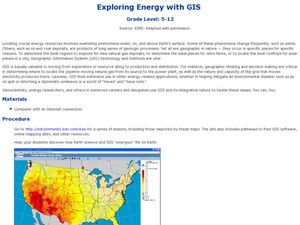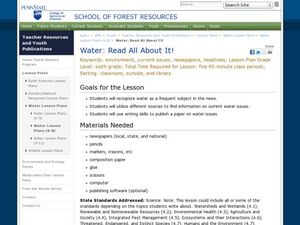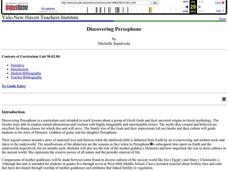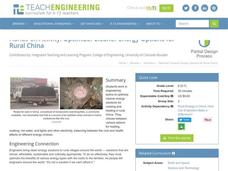Curated OER
A Case of Innovation
Young scholars use strategies to comprehend technical writing. They write reports with great detail, supporting material, and clear vocabulary. They incorporate source materials into their speaking and writing and use voice, tone, and...
Curated OER
Exploring Energy with GIS
Students examine GIS technology as it is used to locate energy sources. In this GIS lesson, student access an assigned website to locate a series of lessons using the GIS software. They use the maps that are located on the primary lesson...
Curated OER
Fieldwork: Horizons Under Ground: Digging Through Wetland Soil
Students study the different soil types and describe the different soils in various environments. In this soil lesson students walk to a reserve and discuss what they saw.
Curated OER
Watershed Landscape
Young scholars demonstrate how water flows by building a human watershed using themselves. In this ecology instructional activity, students compare and contrast point-source and non-point source pollution. They write what they have...
Curated OER
Water: Read All About It!
Students discuss newspapers and water and work in groups to develop their own paper focusing on water issues. In this journalism activity, students discuss the value of newspapers and water as an issue. They work as a group to develop a...
Curated OER
Sounds Good to Me
Middle schoolers determine density and hardness of wood samples based on several investigations. In this physical science and music instructional activity, students visit four centers and perform tests on wood samples to determine...
Curated OER
What Does the Sun Give Us?
Pupils study the sun and how solar energy works. To learn about renewable energy, they complete a lab activity using a pizza box as a solar heater. Quite clever!
Yale University
Discovering Persephone
Here is a resource that introduces learners to how the stories from Greek mythology explain the workings of natural phenomena, movements of the seasons, and how the conflicts of the gods mimic our own daily difficulties. Learners...
Curated OER
Auditing the Energy-Guzzlers in Your Home
Students identify the energy sources in their community as renewable or non-renewable resources. Using their homes, they identify the types of energy they use to heat and power it. They calculate the amount of electricity used by each...
Curated OER
Aquifers: Unlimited or Not
Pupils understand that an aquifer can become a non-renewable resource if it is not used wisely. Students do an experiment that recreates an aquifer in the classroom.
Curated OER
The Wilderness Concept: Our National Parks, History and Issues
Middle schoolers examine the history of the National parks. In groups, they discuss the concepts of conservation and preservation. They discuss the use of natural resources and how some are renewable and non-renewable. To end the lesson,...
Curated OER
Wood You Believe: Wood Products
In this wood products lesson, students walk to a forest near their school where they sit by themselves for a few minutes and quietly observe their surroundings. Students brainstorm wood or wood by products, discuss everything we get from...
Curated OER
Recycling
Learners relate recycling to waste reduction. In this science lesson, students talk about the environment and how recycling certain natural resources actually saves on energy. They also discuss what type of recycling causes pollution...
Curated OER
Designing "Green" to Save Our Green Planet
Students design an environmentally friendly home. In this middle school math/science lesson, students watch videos on creating green design. Students work in collaborative groups to determine what makes a house green and to design a...
Curated OER
Solar
Students study solar energy. In this renewable energy lesson students complete several lab activities using different controls and variables.
Curated OER
Climate and Temperature
Learners explore what the soil temperature would be on the north and south sides of a building. In this temperature lesson, students hypothesize what the results will be using a thermometer and then after a week see what the temperatures...
Teach Engineering
Trash to Treasure!
One person's trash is another man's treasure. Challenge your class to build something useful out of the trash they throw away on a regular basis. Groups design and build a practical item from trash they collect, allowing the class to...
Teach Engineering
Optimize! Cleaner Energy Options for Rural China
What are the trade-offs when looking to get the most benefit from an energy source? Small groups compare the cost-to-emission levels of several energy sources by looking at the information graphically. The groups utilize this information...
Teach Engineering
Energy Conversions
What energy conversions occur in the operation of a device? Small groups investigate devices and the energy conversions that occur. The groups create energy flow diagrams with added conversion processes for each of the devices...
Teach Engineering
Energy Intelligence Agency
Protect the world from energy depletion—join the Energy Intelligence Agency. Using a set of cards, pupils distinguish between correct and incorrect information regarding energy use in the United States. They analyze graphs and diagrams...
Curated OER
More Power to You
Students explore renewable and nonrenewable energy sources and develop a documentary that explores multiple energy sources and draws conclusions about their uses.
Curated OER
Lights Light Up My Life
Students conduct an investigation. In this energy conservation lesson, students observe and make predictions about fluorescent and incandescent light bulbs. Working in groups, students conduct an investigation to compare the two light...
Curated OER
Hawaii's Freshwater Ecosystems
Students examine brackish water. In this Science lesson, students observe organisms found in brackish water. Students record their observations of the various organisms.
Curated OER
Wood, Wood Everywhere
Young scholars examine the usage of wood. In this forestry lesson, students explore the make-up for wood and name several uses of wood in our everyday lives.

























